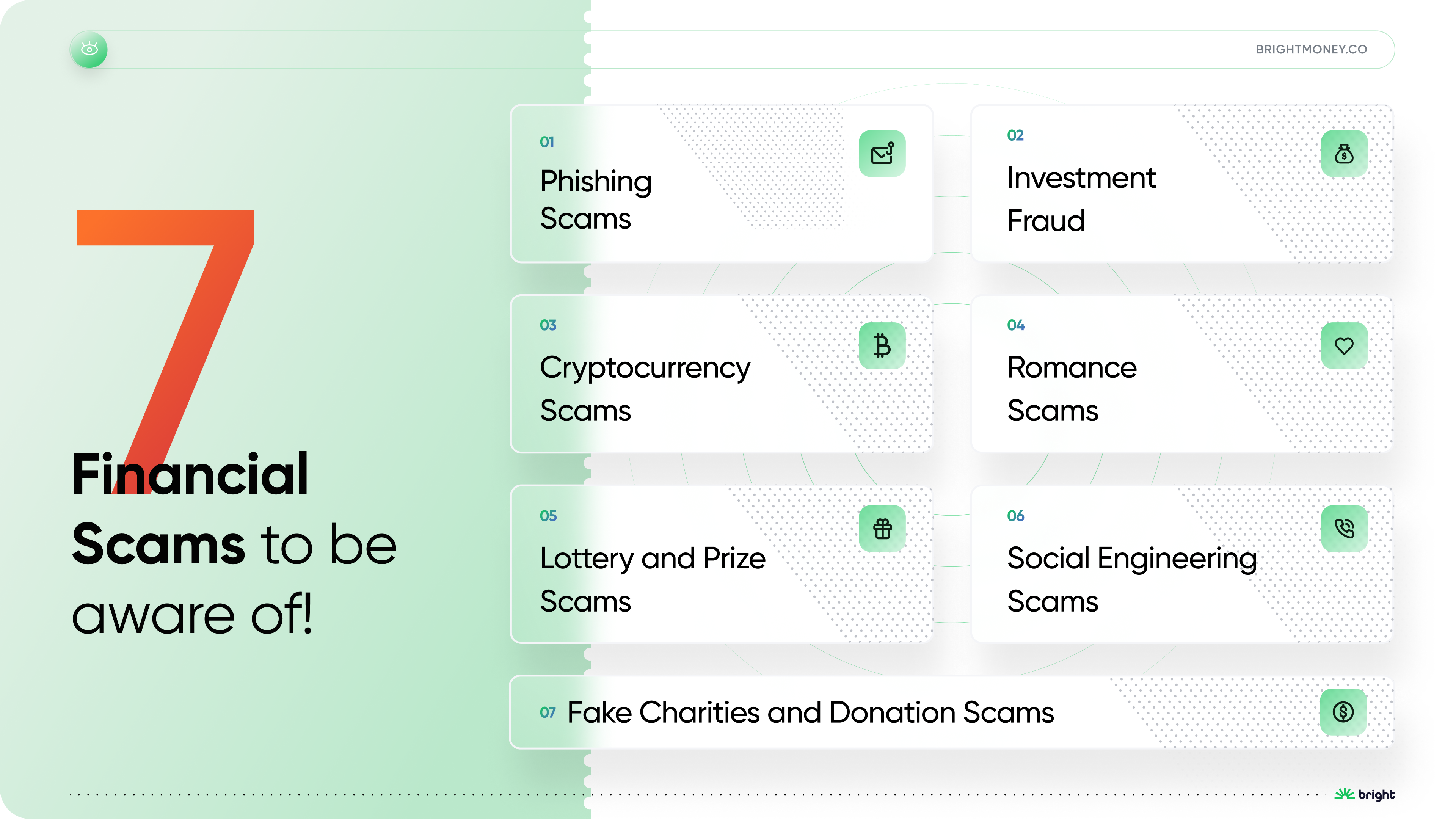You are now leaving the Bright website and entering a third-party website. Bright has no control over the content, products, or services offered, nor the security or privacy of information transmitted to others via their website. We recommend that you review the privacy policy of the site you are entering. Bright does not guarantee or endorse the products, information, or recommendations provided on any third-party website.
In the digital age, the world of finance is increasingly vulnerable to scams and fraudulent activities. Technological advancements have brought numerous benefits but have also opened up new avenues for cunning fraudsters to exploit unsuspecting individuals. In 2023, financial scams continue to evolve, posing significant threats to people's hard-earned money and personal information.
In 2023, financial scams that prey on people's personal information, such as passwords, PINs, and financial information, will be most common. Cybercriminals combine social engineering strategies with data breaches and phishing scams to get this sensitive information. Fraudsters can deplete bank accounts, conduct unauthorized transactions, and use identity theft to commit additional crimes if they have access to such information.
If you encounter any suspicious activities or become a victim of cybercrime, it's crucial to learn how to report cybercrime and notify the relevant authorities or cybercrime reporting centers promptly. By reporting a cybercrime, you not only protect yourself but also contribute to making the digital landscape safer for everyone.
This article lists some practical tips to protect yourself from falling victim to these deceitful schemes. Let's take a closer look at the most prevalent financial scams of 2023.
Read more: How does cybersecurity work with Fintech?

1. Phishing Scams
One of the most ubiquitous and serious hazards in the digital sphere continues to be phishing scams. APWG's Phishing Activity Trends Report for Q4 2022 showed that phishing attacks hit an all-time high in 2022, with more than 4.7 million attacks in total and 1.35 million in Q4 alone.
To deceive receivers into disclosing sensitive information like passwords, credit card details, or personal information, cybercriminals employ phony emails, texts, or websites that look like reputable institutions. In addition to identity theft, money loss, and illegal access to your accounts, this cybercrime can have disastrous results.
Jenny, a small business owner, almost ruined her marketing company with a single click. She fell prey to a phishing scam disguised as an email from her email provider. Believing it was genuine, she unwittingly provided her login details, granting the attacker access to her account and contact list. The consequences of this simple mistake could have been catastrophic for her business.
How to Protect Yourself:
- Before clicking any links or sending sensitive information, always double-check the sender's email address.
- Be wary of demands for sensitive information that seem urgent or shady.
- For each account, create a strong, one-time password, and whenever possible, enable two-factor authentication.[1]
2. Investment Fraud
Investment fraud is more and more common as the financial markets keep changing. The number of investment-related cybercrime cases increased by 15% in 2023 compared to the previous year, according to the US Securities and Exchange Commission (SEC).
One prevalent example of investment fraud is the Distressed Real Estate Scam. In a recent case in Florida, a man allegedly used investors' money for personal gain instead of refurbishing distressed real estate as promised. He pleaded guilty to conspiracy to commit mail fraud and wire fraud. This is just one of the many schemes con artists employ to deceive victims.
Through Ponzi schemes or phony investment opportunities, con artists entice victims with guarantees of large returns on investment. They entice people to part with their cash using skilful sales pitches and marketing strategies, only to disappear after amassing a significant sum.
How to Protect Yourself:
- Be cautious of "get-rich-quick" schemes and promises of guaranteed returns.
- Research and verify the legitimacy of investment opportunities and the people behind them.
- Deal only with licensed and regulated financial advisors or institutions.[2]

3. Cryptocurrency Scams
The rising popularity of cryptocurrencies has attracted both legitimate investors and scammers. The FTC reports that from January 1, 2021, to March 31, 2022, cryptocurrency was identified as the payment method in transactions attributable to fraud. Around 24% of reported dollar losses were due to fraud.
Cryptocurrency scams involve fake Initial Coin Offerings (ICOs), fraudulent exchanges, and Ponzi schemes centered around digital assets. For instance, the BitConnect cryptocurrency fraud saw the founders orchestrating a "textbook" Ponzi scheme that fraudulently obtained US$2.4 billion from investors, promising unrealistically high returns. The decentralized nature of cryptocurrencies makes it challenging to recover lost funds once scammed.
How to Protect Yourself:
- Thoroughly research any cryptocurrency project before investing.
- Avoid investing in ICOs with unrealistic promises and questionable backgrounds.
- Use reputable and well-established cryptocurrency exchanges.[3]
4. Romance Scams
Online dating platforms have provided scammers with a convenient medium to exploit people's emotions for financial gain. The FBI's Internet Crime Complaint Center (IC3) reported that in 2022, cons and romance scams cost Americans $735 million, only slightly behind personal data breaches amounting to $742 million.
One real-life example of a romance scam is Anna's story. Anna believed she had found her perfect man in Andrew, only to discover later that he was a character invented by a criminal gang to extort her. So-called "romance fraud" involves unsuspecting victims being scammed by someone with whom they have formed a relationship. These scams have increased in sophistication and frequency due to the prevalence of online dating.
Romance scammers create fake profiles and build relationships with victims, gaining their trust and affection. Once the emotional bond is established, they manipulate victims into sending money for various fabricated reasons, leaving their victims heartbroken and financially devastated.
How to Protect Yourself:
- Be cautious when interacting with strangers online and avoid sharing personal or financial information too quickly.
- Never send money to someone you haven't met in person, regardless of the reasons they provide.
- Report suspicious profiles and activities to the dating platform.[4]
Read more: Fraud scams up almost 70%, more women targeted
5. Lottery and Prize Scams
Lottery and prize scams often target vulnerable individuals, such as the elderly. In 2017, 2,820 individuals reported sweepstakes and lottery scams to the BBB Scam Tracker, an online tool for tracking scams, with a median loss of $500. Scammers promise victims a large sum of money or valuable prizes. Victims are typically asked to pay fees or taxes upfront to claim their winnings, but the promised rewards never materialize.
One notable case involving lottery fraud is the story of Viktor Gjonaj, a Michigan real estate broker. He convinced his investors that he had cracked the lottery code and tricked them into financing his fraudulent scheme. Gjonaj played the same set of numbers 500 times in one day, which raised suspicions among lottery officials.
Despite supposedly winning, Gjonaj remained emotionless during the lottery claim process. Eventually, his scheme was discovered, and he was charged with wire fraud.
How to Protect Yourself:
- Remember you cannot win a lottery or prize you did not enter.
- Be wary of unsolicited notifications claiming you've won something.
- Never send money to claim a prize.[5]
6. Social Engineering Scams
Social engineering cybercrime involves manipulating individuals into revealing sensitive information or performing certain actions that benefit the scammer. This can occur over the phone, via email, or in person.
According to a report by LookingGlass Cyber and ISACA, social engineering ranked as the top attack type in 2022. Scammers may pose as tech support, government officials, or bank representatives to gain your trust and extract sensitive data.
Even prominent individuals can fall victim to social engineering scams. In 2020, a Shark Tank investor became a target of such a scam. The fraudster impersonated a Shark Tank entrepreneur, using their name and credentials to convince the investor to invest $400,000 in a fake business. The investor, believing it to be a lucrative opportunity, transferred the funds, only to realize later that he had been deceived.
How to Protect Yourself:
- Be cautious when providing personal information over the phone or online.
- Verify the identity of the caller or sender before sharing any data.
- Educate yourself and your family members about common social engineering tactics.[6]

7. Fake Charities and Donation Scams
During times of crisis or natural disasters, fraudsters take advantage of people's generosity by setting up fake charities or donation campaigns. According to a report by the Federal Trade Commission (FTC), consumers reported losing nearly $8.8 billion to fraud in 2022, an increase of more than 30 percent over the previous year. They use emotional appeals to convince individuals to donate money, but the funds never reach the intended recipients.
In a well-known instance, conman Kai Brockington operated a fictitious charity while defrauding both contributors and employers. By offering to use the matching cash for charitable purposes, he persuaded people to mislead about their charitable contributions. Brockington, however, pocketed the funds for himself, forcing the contributors and their businesses to suffer huge financial losses.
How to Protect Yourself:
- Verify the legitimacy of the charity or donation campaign before contributing.
- Make donations directly through the official website of reputable organizations.
- Avoid sharing financial information with unknown charitable initiatives.[7]
Download Bright Money now and experience a brighter financial future with personalized insights. The smart app that helps you save, invest, and achieve your financial goals effortlessly.
Emerging Cybersecurity Measures to Combat Financial Scams
As financial scams continue to evolve and pose significant threats to individuals and businesses alike in 2023, the need for robust cybersecurity measures becomes more pressing than ever.
Let's explore the emerging cybersecurity technologies and strategies being employed to combat cybercrime and protect assets and identities from malicious individuals.
- Biometric Authentication
The use of biometric authentication as a potent weapon against cybercrime is growing. Traditional password-based authentication techniques are vulnerable to hacks since passwords can be taken or guessed, or people can be lured into clicking malicious links. Identity verification is made more convenient and safe through biometric authentication techniques, including voice, facial, and fingerprint scanning.
Biometric authentication is being used more frequently by financial institutions and online service providers to ensure only authorized users access accounts and complete transactions, thereby lowering the risk of identity theft and unauthorized access.[8]
- Machine Learning and AI-Powered Fraud Detection
The volume of financial data created online is always growing, making it difficult for human analysts to manually identify fraudulent activity. Artificial Intelligence (AI) and Machine Learning is being used to create advanced cybercrime detection systems as a solution to this problem. These algorithms can instantly evaluate enormous volumes of data to spot trends and anomalies that might point to fraudulent activity.
Machine learning algorithms can adapt to and learn from new data to keep ahead of emerging risks as con artists regularly change their methods. Financial institutions can quickly identify and stop fraudulent transactions using AI-powered fraud detection, safeguarding assets and private data of their consumers.[9]
- Blockchain Technology
Blockchain technology, most commonly associated with cryptocurrencies, is finding broader applications in the financial industry. The decentralized and immutable nature of blockchain makes it inherently secure against data tampering and unauthorized access.
Financial institutions are exploring blockchain-based solutions for secure data storage, smart contract implementation, and identity verification. Blockchain can enhance transparency and traceability in financial transactions, making it more difficult for fraudsters to exploit loopholes and cover their tracks.[10]
Conclusion
As technology continues to advance, financial scams in 2023 are becoming more sophisticated and prevalent. Protecting yourself from these deceitful schemes requires vigilance, skepticism, and awareness of the latest scams. By staying informed and implementing preventive measures, you can safeguard your assets and personal information from falling victim to financial cybercrime.
Remember, if something seems too good to be true, it probably is – trust your instincts and seek advice from reputable financial professionals if you're unsure about an investment or financial opportunity. Stay alert, stay safe, and be proactive in guarding your financial well-being in this rapidly evolving digital landscape.
Secure your financial future with Bright Money - Sign up today to receive personalized insights and expert guidance with just a few clicks on your laptop or smartphone.
References:
- https://www.imperva.com/learn/application-security/phishing-attack-scam/
- https://www.investright.org/avoid-fraud/types-of-investment-scams/
- https://www.techtarget.com/whatis/feature/Common-cryptocurrency-scams
- https://consumer.ftc.gov/articles/what-know-about-romance-scams
- https://consumer.ftc.gov/articles/fake-prize-sweepstakes-lottery-scams
- https://www.tripwire.com/state-of-security/5-social-engineering-attacks-to-watch-out-for#:~:text=Types%20of%20Social%20Engineering%20Attacks,quo%2C%20tailgating%20and%20CEO%20fraud.
- https://www.aarp.org/money/scams-fraud/info-2022/charity-donations.html
- https://www.logintc.com/types-of-authentication/biometric-authentication/#:~:text=Biometric%20authentication%20refers%20to%20a,that%20user%20accesses%20their%20account.
- https://cointelegraph.com/explained/how-is-artificial-intelligence-used-in-fraud-detection
- https://www.formica.ai/blog/how-does-blockchain-prevent-fraud
FAQs
Q. What should I do if I suspect I have fallen prey to a financial scam?
If you suspect you've been scammed, act immediately. Contact your financial institution to report the incident and freeze any affected accounts. Additionally, file a complaint with your local law enforcement or the appropriate regulatory agency. Prompt action may help recover some lost funds and prevent further damage.
Q. Are mobile banking apps safe to use in 2023?
Mobile banking apps can be safe if you take precautions. Ensure you download the official app from a reputable source, enable biometric authentication or multi-factor authentication, and avoid accessing your accounts on public Wi-Fi networks. Regularly update your app and operating system for the latest security patches.
Q. How can I differentiate between a legitimate investment opportunity and a scam?
Always conduct thorough research before investing. Check if the investment opportunity is registered with the appropriate regulatory bodies. Beware of promises of guaranteed returns or high-profit margins with low risk. Seek advice from licensed financial advisors and avoid making hasty decisions under pressure.
Q. What are some signs that an email might be a phishing attempt?
Be wary of emails with misspellings, suspicious sender addresses, urgent requests for personal information, or generic greetings. Legitimate organizations usually address you by your name. Hover your cursor over links to check the URL before clicking. Avoid downloading attachments from unknown sources.
Q. How can I protect my personal information from social engineering scams?
To protect your personal information, be cautious when sharing it over the phone or online. Verify the identity of the caller or sender, especially if they ask for sensitive data. Don't provide personal information to unsolicited requests, and educate yourself and your family about common social engineering tactics.



